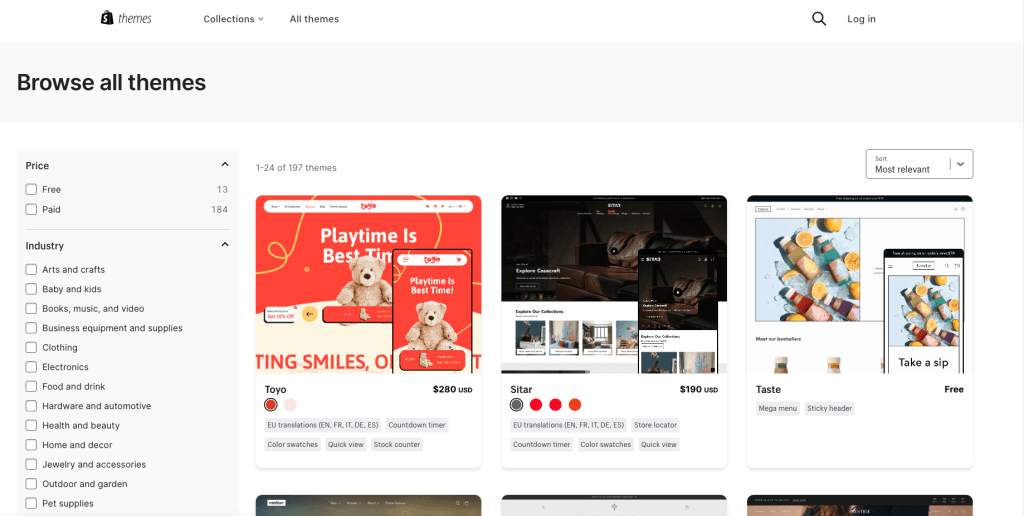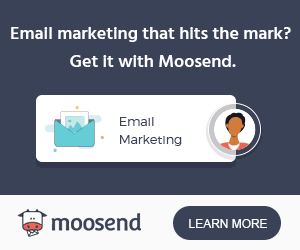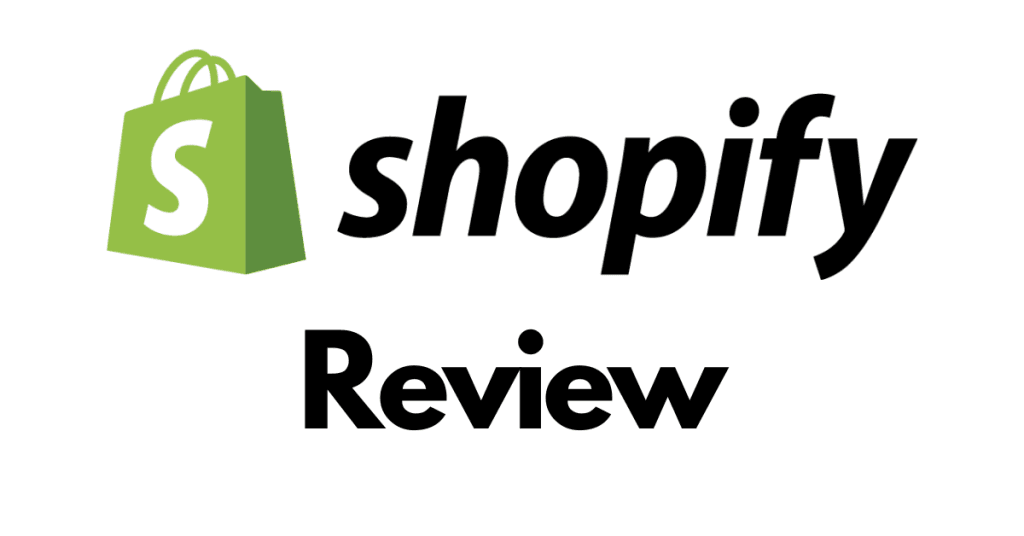TLDR – Get your Shopify £1/a month 3 month Trial here.
If you run an e-commerce business or are considering it, then you’ll have definitely heard of Shopify. It has emerged as the leading ecommerce platform for building online stores, with bucket-loads of features that make running your website seamless and easy.
I’m a web designer by trade and I’ll be honest, I really didn’t like Shopify at the start. I felt it was limited in what you could do with it, in terms of designs. Now though, as it has grown in popularity and more developers have created more themes and apps, it’s really become the full package.
Here’s a comprehensive Shopify review, covering its pros, cons, features, and pricing to help you decide if it’s the right fit for your ecommerce business.
Shopify Review
What is Shopify?
Shopify is a powerful e-commerce platform that allows side-hustlers, small businesses, big businesses and everyone in between to create, customize, and manage their online storefronts. Known for its super clean and user-friendly interface and extensive app store, Shopify provides a very fast route to selling online.

Key Features of Shopify
There’s just something about a Shopify store. It just feels clean and trustworthy. Here’s more we love about it –
1. User-Friendly Interface: Shopify’s simple drag-and-drop interface allows you to build and customize your ecommerce site without any coding knowledge at all. You want a banner? Drag a banner in and add your text. Simple. This easy-to-use interface makes Shopify a platform that’s accessible to complete beginners whilst also being super convenient for experienced users who are just looking to save time.
2. Variety of Themes: This was a real sticking point for me years ago. It really felt like you could only change the colours and fonts, now though, the themes for the platform are in their thousands, and grow daily. Shopify themselves off a few powerful free themes that are lightning fast, good for SEO, mobile-responsive and customizable. Then on top of those, you have your pick of thousands of paid themes made by third parties for your storefront.

3. Secure and Reliable: Unlike the likes of WordPress that requires you to buy a hosting plan, Shopify takes care of all of the hosting and security, ensuring your store is always up and running smoothly (and lightning fast). With built-in SSL certification and compliance with PCI standards, Shopify also protects your customers’ data and builds trust.
4. Extensive App Store: Another big sticking point a few years ago, the Shopify App Store now features thousands of apps that can Integrate with your store and massively extend its functionality. There’s nearly an app for everything, from email marketing tools to inventory management, these apps help you tailor your storefront to meet your needs.
5. Integrated Payment Processing: Shopify Payments allows you to accept credit cards directly on your site without the need for third-party accounts. It supports all the essential payment methods, including PayPal, Apple Pay, and Google Wallet, providing a seamless checkout experience for your customers.
6. SEO and Marketing Tools: Shopify includes built-in SEO features to help improve your store’s visibility in search engines. Additionally, marketing tools like email marketing campaigns, social media integrations, and discount codes help drive traffic to your store and ultimately increase sales for your online business.
Pros of Shopify
1. Ease of Use: Shopify have this down to a fine art now. Their user-friendly interface makes the process of setting up and managing an ecommerce website really simple. Its drag-and-drop builder allows you to create a professional-looking store without any technical skills. You actually don’t have to do much at all to create your first store. You can even just add your logo and your products and you’re good to go, but you’ll probably want to add a bit of your own flair.
2. Scalability: Whether you’re starting small or scaling up, Shopify grows with your business. It offers plans and features that cater to you as you grow so it’s suitable whether you’re a startup or a large enterprise.
3. Comprehensive Support: Shopify provides 24/7 customer support through various channels, including live chat, email, and phone. There are also thousands of YouTube tutorials and forums dedicated to Shopify, so you’ll never be stuck for help.
4. Mobile Optimization: The majority of shoppers are on their phones these days, so this is vital. Shopify does this really really well. It ensures your store looks great and functions well on all devices. All theme are mobile-responsive and they also have a dedicated mobile app that helps you manage your store on the go.
5. Multichannel Selling: Shopify allows you to sell on multiple platforms, including Facebook, Instagram, Amazon, and eBay. This omnichannel capability expands your reach and increases your sales opportunities.
Cons of Shopify
1. Transaction Fees: If you use a payment gateway other than Shopify Payments, transaction fees apply, which can add up when you start making higher numbers of sales. However, this can be mitigated by using Shopify Payments.
2. Cost: While Shopify offers a range of pricing plans, the costs can be higher compared to some other platforms like WordPress and Woocommerce or Magento. That being said, when you take into account the time it takes to get set up on these other platforms, and the various plugins that come with them, there won’t be much difference.
3. Customization: Whilst it has gotten considerably better, you’re still going to be able to get more customization on other platforms. Whether you need it or not is another question. Shopify have created a near-perfect recipe and you’ll probably not want to stray too far from it.
Shopify Pricing
Shopify offers several pricing plans to suit different business needs:
- Basic Shopify: At $29 per month, this plan includes all the essentials to start a new online store with unlimited products, and 24/7 support.
- Shopify: For $79 per month, this plan adds features like gift cards, professional reports, and better shipping discounts, making it ideal for bigger businesses.
- Advanced Shopify: Priced at $299 per month, this plan offers advanced features like third-party calculated shipping rates and advanced report builder, catering to really big businesses with more complex needs.
- Shopify Plus: Custom pricing for enterprise-level businesses with high-volume sales, providing advanced features and dedicated support.
Final Thoughts
Shopify is brilliant. I recommend it to most of my clients nowadays. Especially if you’ve used the likes of WordPress before, you’ll find Shopify a breath of fresh air. Is it the best ecommerce platform? At the moment, I think so.
It’s interface, both for you and your customers is so clean, it makes selling products online easier for everyone, regardless of your experience.
Whether you’re just starting out or looking to scale your existing business, Shopify’s range of features and flexible pricing plans can help you achieve your ecommerce goals.
Visit the Shopify website for more details and to start your free trial today.
FAQ’s
How does Shopify compare to other e-commerce platforms like Bigcommerce?
Compared to Bigcommerce, Shopify is known to have a better interface and extensive app ecosystem, making it easier for merchants to customize their stores. Both platforms offer great e-commerce features, but Shopify excels in ease of use and a smoother shopping experience.
Can I accept payments on Shopify?
Yes, Shopify enables you to accept payments through various methods, including credit cards, PayPal, Apple Pay, and Google Wallet. Shopify Payments, its built-in payment gateway, offers a compliant and secure way to handle transactions directly on your web store.
How does Shopify handle mobile commerce?
Shopify is optimized for mobile commerce, ensuring your commerce website looks great and functions well on all devices. All Shopify themes are mobile-responsive, providing a seamless shopping experience for customers browsing on smartphones and tablets.
What kind of bandwidth does Shopify provide for hosted e-commerce?
Shopify offers unlimited bandwidth for all its plans, meaning your hosted e-commerce store can handle any amount of traffic without additional charges. This ensures that your site remains fast and reliable even during high traffic periods.
Does Shopify offer multi-channel selling?
Yes, Shopify supports multi-channel selling, allowing you to sell your products on various platforms, including Facebook, Instagram, Amazon, and eBay.
How does Shopify handle order management and fulfillment?
Shopify provides comprehensive order management tools that streamline the process of tracking and fulfilling orders. The platform integrates with various fulfilment services and allows you to automate shipping calculations, print shipping labels, and manage inventory easily.
Is Shopify an open-source e-commerce platform?
No, Shopify is not an open-source platform. It is a hosted ecommerce software solution, which means it handles hosting, security, and updates for you. If you prefer an open-source e-commerce solution, you might consider alternatives like WooCommerce or Magento.
How does Shopify support SEO and search-engine optimization?
Shopify includes built-in SEO features that help improve your store’s visibility in search-engine results. It allows you to edit meta tags, URLs, and alt text for images, and it integrates with popular SEO apps to further enhance your commerce website’s performance.
Can Shopify handle high traffic volumes?
Yes, Shopify can handle high traffic volumes due to its robust infrastructure and unlimited bandwidth. This makes it an excellent choice if you’re expecting large amounts of traffic and in need of a reliable hosted e-commerce solution.
What features does Shopify offer to help me create an online store?
Shopify offers a range of features to help you create an online store, including customizable themes, a drag-and-drop builder, integrated shopping-cart functionality, and numerous apps to extend your store’s capabilities. These tools make it easy to set up and manage a professional web store.
What makes Shopify a good e-commerce solution for online retailers?
Shopify is a versatile ecommerce solution designed to meet the needs of online retail. It offers a comprehensive suite of tools to help you sell online, including an online store builder, secure payment processing, and extensive marketing features. This makes it a powerful and affordable platform for driving online sales and growing your ecommerce store.
Can Shopify integrate with accounting software like QuickBooks?
Yes, Shopify integrates seamlessly with QuickBooks, allowing you to manage your finances efficiently.








